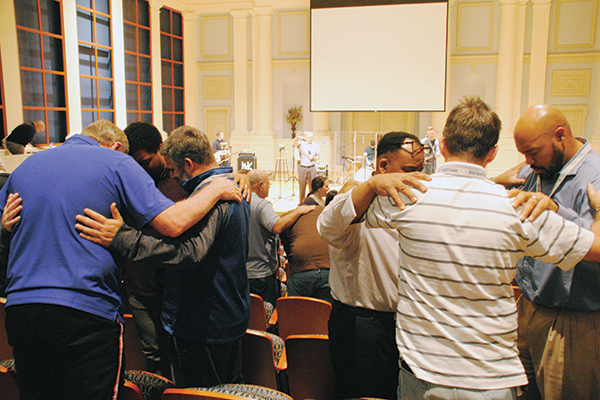By Grace Thornton
The Alabama Baptist
He was strung up by his arms in an Asian prison when the man came up to him and asked to know about his Jesus.
“If I tell you, they will beat me even more,” the Christian — who’d been beaten and electrocuted repeatedly — replied.
But the man told him the coast was clear — he’d put something in the drinks of the other guards to knock them out for a little while. He had to know about Jesus, he said — because earlier when the guards had beaten the Christian, his face glowed.
Spirit of urgency
“That disciple was filled with a closeness with God and a spirit of urgency, and as a result, thousands of house churches were started. It’s like Acts all over again,” said Craig Etheredge, a Texas pastor who leads the FlashPoint Disciple-Making Conference. “Do you have that urgency? Because if you don’t, what you have will never go further than you.”
Etheredge, who also is founder of discipleFIRST, was 1 of 8 speakers at the recent FlashPoint conference held at Samford University in Birmingham on Jan. 13–14.
The conference was aimed at encouraging churches to get back to making disciples the way Jesus intended for it to be done, said Daniel Edmonds, director of the office of Sunday School and discipleship for the Alabama Baptist State Board of Missions (SBOM). SBOM co-sponsored the event with Samford’s Ministry Training Institute.
About 200 people from around the state participated.
“It’s a good size for the conference — that’s about the number they want so that it can be interactive and can start a movement,” Edmonds said.
Kevin Blackwell, executive director of MTI, which also hosted the event, said he’s “excited” about what God is doing through FlashPoint.
“You’re empowered with the greatest force in the universe — the Holy Spirit,” he told conference participants during the kickoff session Jan. 13. “We’ve got all the tools and the resources and Jesus gave us a model to use — now we’ve just got to go do it.”
Robby Gallaty, pastor of Longhollow Baptist Church, Hendersonville, Tennessee, and one of the conference speakers, said the Church suffers from one major challenge when it comes to discipleship.
“We’ve taught people how to share their faith, but we haven’t taught them to share their life,” he said. “We invite people to come to Christ, yes — but we also have to invest in those we invite.”
‘Catch and consume’ culture
The Church today is a “catch and consume” culture, not a “develop disciples and deploy” culture, Gallaty said.
The resounding answer to all of the world’s problems — from abortion to nuclear weapons to millennials leaving the Church — is discipleship, he said. “If we make disciples, we are going to enact change.”
Sometimes the Church glamorizes Jesus’ disciples when really they were just ordinary men who knew Jesus and invested their lives in others, Gallaty said.
“We are the result of them — that legacy is why we’re here today. What could happen if you got serious about leaving a lasting legacy? What could happen in your staff, your church, your neighborhood, your community? I wonder what God could do if you went all in,” Gallaty said. “I think we’d see a New Testament Church.”
When Christians really know Christ, what happens in the body of Christ will begin to spill out into the world — that’s why Ken Adams, pastor of Crossroads Church, Newnan, Georgia, told conference participants it’s critical for believers to act in love toward each other.
“If we don’t really have love for one another, all these other things we’re doing in Christ’s name are really a bunch of noise,” Adams said. “People ought to look at disciples and go, ‘I want what you’ve got.’ When the family of God can’t get along, why would anyone want to be a part of it?”
West Brazelton, pastor of Grace Bible Church, Houston, Texas, said in order for Christians to really make disciples, it has to be what their whole lives are about.
“It’s not about fitting discipleship into our busy schedules — God’s work shouldn’t be just shoehorned in there,” he said. “It’s about making everything in our life about discipleship. For example, our jobs aren’t about making money — they’re about making disciples.”
Etheredge said when he trains disciples to be disciple makers, he focuses on the four “fields” of their life where they can invest in others — where you live, where you learn, where you work and where you play.
“Every one of us has these fields, and we have to train ourselves and our disciples to be intentional to cultivate relationships there,” he said. “You have to have an urgency. You have to be a friend of sinners like Jesus was and live life on life with other people.”
It’s not about having an evangelism program to get people fired up, he said — “it starts with you.”
Set the example by your action and share stories with your church about your own work in your own fields, Etheredge said. “Befriend people who don’t know Christ, care about them and encourage them to explore, connect, grow and multiply as they walk down the road of discipleship with you.”
Pre-conversion
Discipleship starts pre-conversion, he said, and Christians don’t have the luxury of picking which phases they like better.
Etheredge recounted the story of a pastor who approached him after a conference and asked if it was OK for him to continue the ministry the way he had been doing.
“He said, ‘Can I just meet with a few guys and pray and preach the Word?’ I think in that question he verbalized what a lot of us think. But God is calling us to be intentional about reaching those who aren’t on the path to life. We have to develop that urgency.”






Share with others: